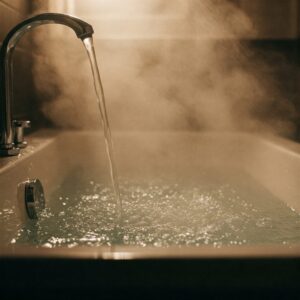
Houston water heater repair usually justifies the effort from a cost-value point of view. Installing a new water heater, unless your existing heater is extremely inefficient and leaky, takes time to recover the costs through water and energy savings. However, with a tankless water heater the potential for faster payback increases due to its on-demand heating. You only heat water when you need it, eliminating the standby heat loss associated with traditional tanks. This can lead to significant energy savings over time, potentially shortening the recovery period for your investment, especially in households with fluctuating hot water demands.
If you’ve decided to invest in a new unit, your next big question is likely to be whether to install a tankless water heater instead of a traditional, reservoir-style tank heater. We’re here to help you figure it out. As a trusted residential plumbing company, our experienced plumbers have installed many tankless water heaters in Houston homes just like yours. Contact us directly to get more information or to schedule a water heater service appointment.
How Houston Tankless Water Heaters Work
Because tankless heaters are small, plumbers can often install them right where you use the most hot water, like near your main bathroom or kitchen. This shortens the distance hot water has to travel. When you turn on the hot water tap, the heater kicks on immediately and starts heating the water flowing through it. You don’t have to wait for a tank to empty and refill or for the stored water to heat up.
Traditional tank water heaters constantly heat a large tank of water, even when you don’t need it. Think of a regular water heater tank like a thermos – it tries to keep the water inside hot, but some heat always escapes through the tank walls. This is called standby heat loss, and it’s a constant energy drain. Tankless heaters don’t have a tank of stored hot water, so there’s no standby heat loss. The heat exchanger, which uses coils to transfer heat to the water as it flows through, is only active when you’re using hot water. Once you turn it off, the heating stops. This efficient heat transfer, similar to how your AC cools air or your car radiator cools the engine, minimizes wasted energy.
You also have flexibility in the type of fuel you use with a tankless system. You can choose:
- Electric: These models use electricity to heat the water.
- Gas (Natural Gas): These are often powerful and can heat a lot of water quickly, but they need a gas line connection and proper venting.
- Propane: If you don’t have natural gas, propane models are also an option.
Regardless of the fuel type, the system is triggered by the flow of water. When the water starts flowing through the unit, it activates the heating process. This ensures that you get hot water almost immediately.
Can You Recover Your Costs when Going Tankless?
Tankless water heaters use less energy, but they cost more to buy. To see if the savings are worth it, think about these things:
How Much Hot Water You Use: Figure out how many gallons of hot water your family uses each year. A common estimate is that each person uses around 40-60 gallons of hot water per day. Multiply this average by the number of people in your household and then by 365 days to get a rough annual estimate. However, keep in mind that your actual usage could be higher or lower depending on your habits (long showers vs. short, frequent baths, how often you do laundry and dishes, etc.).
Installation Costs: Get prices for installing both tankless and regular water heaters. Bigger homes or needing hot water in one specific spot might mean a different tankless system and cost. Plus, the type of installation can affect your final price. Gas tankless heaters often require larger diameter gas lines to supply enough fuel for their powerful burners, so your existing gas line might need to be upgraded. Alternately, high-demand electric tankless heaters might need new dedicated circuits or even upgrades to your electrical panel to handle the load.
Comparing Running Costs: Look at past bills for your old water heater. Find out how much water, gas, and electricity cost now. Check how efficient both types of new heaters are. Then, based on how much hot water you use, calculate how much money a tankless heater could actually save you on your bills.
Thinking Long-Term: After figuring out how long it will take to save enough money to cover the extra cost of the tankless heater, think ahead. Will you still live there when you finally save that money? Will the tankless heater last long enough to make it worth it? Will you need a complicated tankless system where hot water takes a while to arrive? Could you end up using more water while waiting for it to get hot, even if you save energy?
Which Type of Water Heater Fits Your Lifestyle?
For Larger Houston Homes
If your Houston home is large with many people using hot water for numerous toilets, baths, showers, sinks, and appliances, a single tankless system might need to be very complex to handle the demand. You might even need several smaller tankless heaters installed in different parts of your house. More complex systems can mean a higher chance of issues, unexpected repairs, and needing a Houston plumber. In this case, saving enough money to cover the initial cost of a tankless system might be hard. This is because your current tank water heater is likely being used frequently by everyone, which can make the cost per use seem lower due to less standby heat loss relative to the amount of hot water used.
For Smaller Houston Homes
If you live alone and mainly use hot water in a small area of your Houston home or apartment, a tankless heater could save you money by not constantly heating a full tank. However, if you don’t use much hot water or energy for heating water, it could still take a while to get back the money you spent on the tankless system through lower bills.
Expert Installation for Houston Tankless Water Heaters
For expert tankless water heater installation in Houston, trust Santhoff Plumbing and enjoy endless hot water and energy savings with a professionally installed system. Choose our team for quality residential plumbing service and repair for your home.
Save

